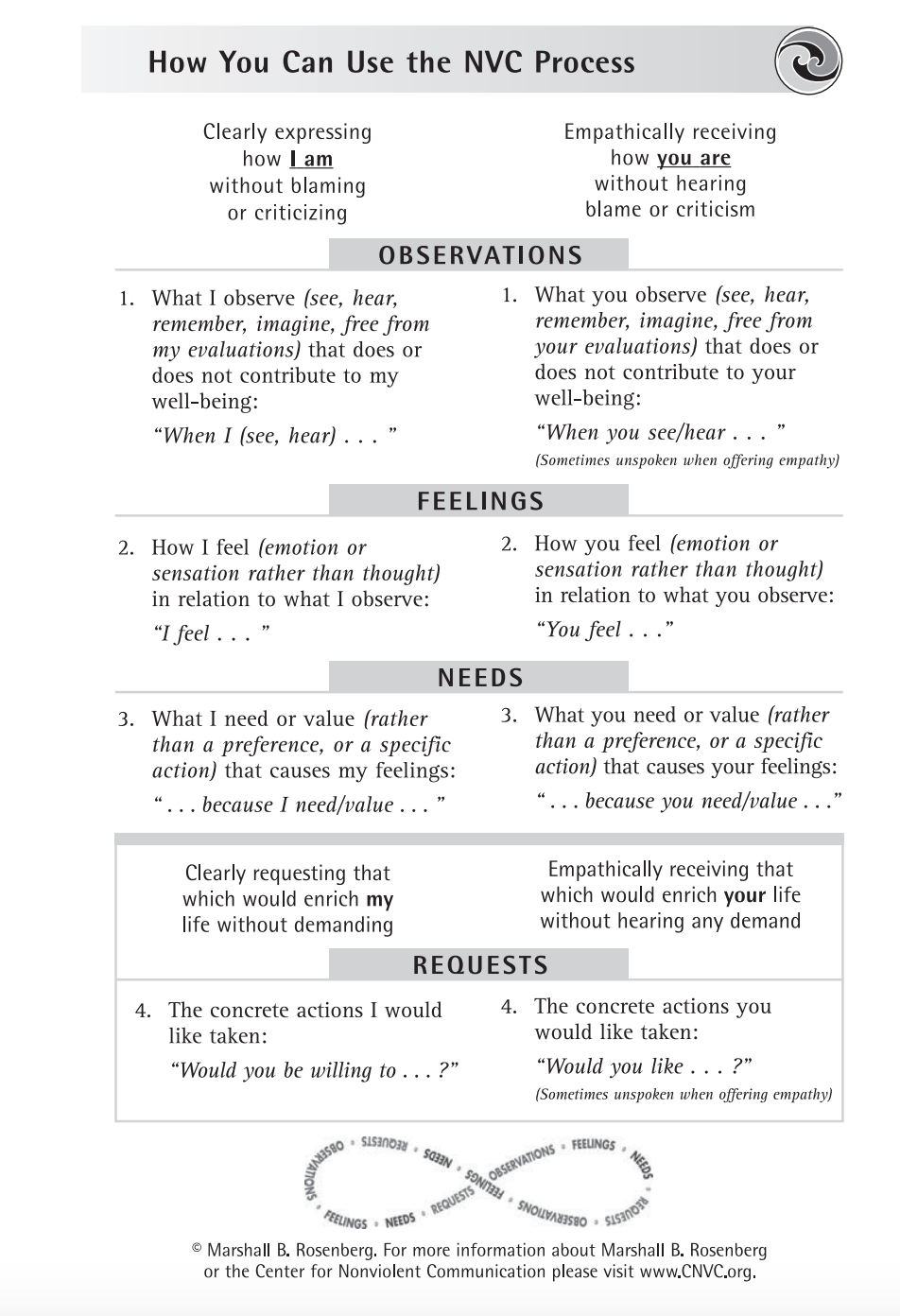Communication
Potential Learning Outcomes
Discussion Topics
Styles of Communication
Non-violent Communication
(see NVC Process outline on the next page)
Listening
Being Heard
Timing
Boundaries
- Non-violent Communication
- Listening
- Being Heard
- Timing
- Boundaries
- Community resources
- Non-violent Communication
Potential Learning Outcomes
- Develop skills and practice for communicating.
Discussion Topics
Styles of Communication
- Passive, Aggressive, Assertive, Passive-aggressive
- When and why might we use each?
- Effectiveness?
Non-violent Communication
(see NVC Process outline on the next page)
Listening
- Taking notes
- Checking for understanding
- Hearing without comparing
- Hearing “No” and respecting it
Being Heard
- Stigma and Marginalization
- Being discounted
- Finding clarity
- Ensuring understanding
- Tone, language and volume
- When and where of effective communication
Timing
- Consent- “Is now a good time? Can we set up a better time?”
Boundaries
- Where do we feel boundaries? How do we tune into and value “gut intelligence”?
- Practicing No, yes and conditions
- Needs and desires
Lesson Plan Street School
Title of Class: Street Language Dialects
Maximum Class Size: ~20 (room dependant)
Minimum Class Size: 1
Time needed: 20-30 minutes
Brief description of class:
Many of us speak differently depending on who we are with or what we are talking about. This idea has been explored and spoken of widely in relationship to African American Vernacular English in relationship to English as spoken in the government, media, etc. Within our communities, we may speak differently with our families, or at work, than we do with our dealers or our close friends. Language hierarchies often value the languages we speak outside of Consumer Capitalist culture are not as “real” or indicate a stigmatized status.
We also know that there are certain words that do not have translations across all languages. Inuit languages have many words for snow, and the Scandinavian concept of hygge doesn’t really translate perfectly outside of the context of long dark cold winter days.
Resource(s):
Decoded: Francesca Ramsay goes through AX vs ASK, and talks about AAVE, code-switching and implications of language hierarchies
https://www.youtube.com/watch?v=l-VnitbeS6w
Stigmatizing language, and preferable alternatives.
https://www.bbc.com/news/uk-42630131?fbclid=IwAR25hYEgcWR_0PEsn6ITV4pQSOyCvVGetVV5v0as_dZ4DpB9qTnjmwUOrhk
Discussion prompts:
Do we have words or phrases that we talk about as drug users, about the drugs we use, or the experiences that we have?
Sharing and appreciating the language we are part of evolving, who better to be on the cutting edge of how language develops about drugs, than those who are using drugs.
Language reclamation can involve marginalized people reclaiming words used against themselves. This means that someone with experience may use the word “junkie” about themselves, but may not be ok with others using that word or label to refer to them. How do we relate to words that hurt us? When and how do we choose to use certain words or not?
Title of Class: Street Language Dialects
Maximum Class Size: ~20 (room dependant)
Minimum Class Size: 1
Time needed: 20-30 minutes
Brief description of class:
Many of us speak differently depending on who we are with or what we are talking about. This idea has been explored and spoken of widely in relationship to African American Vernacular English in relationship to English as spoken in the government, media, etc. Within our communities, we may speak differently with our families, or at work, than we do with our dealers or our close friends. Language hierarchies often value the languages we speak outside of Consumer Capitalist culture are not as “real” or indicate a stigmatized status.
We also know that there are certain words that do not have translations across all languages. Inuit languages have many words for snow, and the Scandinavian concept of hygge doesn’t really translate perfectly outside of the context of long dark cold winter days.
Resource(s):
Decoded: Francesca Ramsay goes through AX vs ASK, and talks about AAVE, code-switching and implications of language hierarchies
https://www.youtube.com/watch?v=l-VnitbeS6w
Stigmatizing language, and preferable alternatives.
https://www.bbc.com/news/uk-42630131?fbclid=IwAR25hYEgcWR_0PEsn6ITV4pQSOyCvVGetVV5v0as_dZ4DpB9qTnjmwUOrhk
Discussion prompts:
Do we have words or phrases that we talk about as drug users, about the drugs we use, or the experiences that we have?
Sharing and appreciating the language we are part of evolving, who better to be on the cutting edge of how language develops about drugs, than those who are using drugs.
Language reclamation can involve marginalized people reclaiming words used against themselves. This means that someone with experience may use the word “junkie” about themselves, but may not be ok with others using that word or label to refer to them. How do we relate to words that hurt us? When and how do we choose to use certain words or not?
